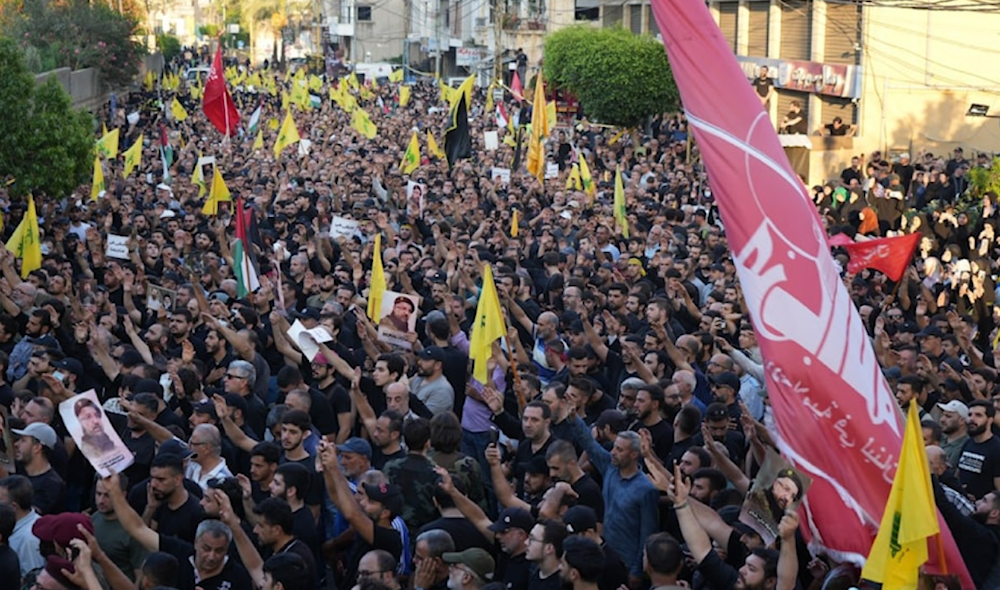Beirut's Dahiya bids farewell to Hezbollah martyr leader Fouad Shokor
The New York Times described the scene as a "sea of mourners" who raised their fists as they marched through the streets.
-

From the funeral of the martyr leader Sayyed Fouad Shokor in the southern suburb of Beirut Dahiya on August 1, 2024 (Al Manar Lebanese TV)
Beirut's southern suburb of Dahiya has bid farewell to Hezbollah leader martyred Sayyed Fouad Shokor with the participation of large crowds who expressed their support for the Islamic resistance in Lebanon.
Large crowds participated on Thursday in the ceremonies before he was buried in Rawdat Al-Hawraa in Ghobeiry.
The head of Hezbollah's Executive Council, Sayyed Hashem Safieddine, led the funeral prayer for the martyr.
مراسم تشييع الشهيد القائد #فؤاد_شكر "السيد محسن" في #الضاحية_الجنوبية لبيروت.#لبنان#الميادين_لبنان pic.twitter.com/A0nx5rRN0N
— الميادين لبنان (@mayadeenlebanon) August 1, 2024
The funeral witnessed large Palestinian participation from resistance factions and Palestinian people as crowds flocked from the camps to the Sayyed al-Shuhadaa complex in Dahiya.
The New York Times described the scene as a "sea of mourners" who raised their fists as they marched through the streets.
The mourners chanted slogans in support of the resistance, while some of them carried pictures of other martyrs who were killed during the last months. They also raised the flags of Hezbollah, Palestine, and the countries of the Axis of Resistance.
Nasrallah ushers in a new phase, asserts retaliation is inevitable
The Secretary-General of Hezbollah, Sayyed Hassan Nasrallah confirmed on Thursday that the Israeli attack on Hareit Hreik in the southern suburbs of Beirut was an aggression targeting civilian buildings and killing civilians, not just an assassination operation.
The aggression resulted in the martyrdom of five civilians, three women, and two children, in addition to Iranian military advisor Milad Bidi.
"The enemy targeted a building full of civilians in Haret Hreik during the assassination of martyr Fouad Shokor. We extend our condolences and congratulations to the families of the martyrs for the loss of their loved ones and for them being awarded the honor of martyrdom, as the… https://t.co/UNJtzDwNjx
— Al Mayadeen English (@MayadeenEnglish) August 1, 2024
In a speech delivered at a large funeral ceremony held for Hezbollah's assassinated top military leader Sayyed Fouad Shokor, Sayyed Nasrallah said that the Israeli regime tried to label its aggression as a "response" to the incident in Majdal Shams.
He reiterated that the Resistance has rejected this accusation and denied responsibility after a thorough investigation, adding that "we have the courage to take responsibility if it was our attack, even if it was a mistake, and we have precedents in this matter."
A new phase of operations
Announcing a new phase of the confrontation, Sayyed Nasrallah said: "We are facing a major battle where matters have surpassed the issue of support fronts," announcing, "We are in an open battle on all fronts, and it has entered a new phase." He emphasized that the escalation of the new phase "depends on the reactions of the [Israeli] occupation."
Reaffirming the Resistance Axis' position announced on the day of the Israeli war on Gaza, Sayyed Nasrallah said that those who want to spare the region a larger and worse escalation, "must compel Israel to stop its aggression on the Gaza Strip," and that "there will be no solution except by stopping the aggression."
Following the Israeli aggression on Beirut, Hezbollah did not carry out any operations.
Sayyed Nasrallah announced that the Lebanese support front would return actively to what it was by Friday morning, explaining that attacks were paused until concluding the funeral processions of the martyred Hezbollah leader and Lebanese civilians.
However, he emphasized that the operations have "nothing to do with the response to the [assasination] of martyr Shokor".
Hezbollah's chief revealed that the group has been contacted by countries and parties around the world to either talk it out of responding or threaten against it, adding that Hezbollah made it clear that this is not up for debate.
He declared that the Israeli regime and its backers "must await our inevitable response" and that "there is no debate or argument about this."
"The decision is now in the hands of the frontline, its circumstances, and the opportunities it offers. We are looking for a solid and well-studied response, not a formal one."

 4 Min Read
4 Min Read








